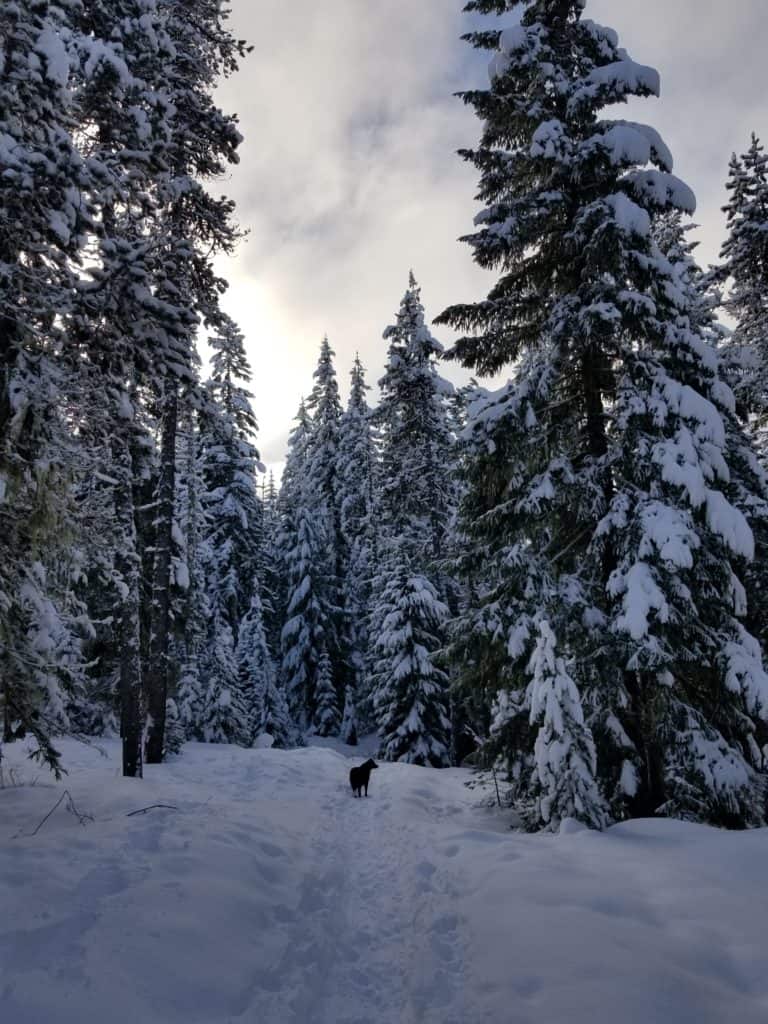
I recently spent a few days with my family on Mt. Hood, surrounded by a blanket of snow. With snow falling and envigorating hours spent hiking with our dogs, I found myself feeling dehydrated. We would return from a snow hike and I would drink 12-16 ounces of water, finding myself thirsty again throughout the afternoon. After 3 days my family consumed over 7 gallons of water! Despite the increased water intake, all of us experienced dryer skin and chapped lips. I also noticed fewer trips to the bathroom, and I frequently use the facility when I drink water throughout the day. Even our dogs drank bowls and bowls of water!
Here are a few things worth sharing from this experience. First, regardless of the temperature, we all need more water at higher elevations. The air pressure is lower at higher elevations, and we lose water through increased respiration and evaporation from lungs, skin, and air passages. Second, when the weather is cold, our bodies work harder to maintain body temperature. This increases metabolism and water requirements, even at lower elevations. Third, when it is cold outside most of us stay indoors more. Inside air is dry increasing water losses through respiration and evaporation. Dehydration adds stress to the kidneys, cardiovascular system, and brain, though it affects all body systems. You might notice more frequent headaches, darker urine, and elevated blood pressure when you are feeling dehydrated. Maintaining a habit of water drinking during every season can improve health in many ways.
It can be difficult to maintain hydration during the cold winter months, however. For older individuals, if they experience more frequent trips to the bathroom, it can be a deterrent from drinking water. For people who are easily chilled, the thought of a glass of water in the winter may not be very appealing. For children, drinking water may not be the first choice of beverages, especially if they are used to juice and soda. For adults, winter cheer may come with alcoholic and coffee drinks, adding to dehydration.
So, what is a person to do, especially if water is not the first choice of beverage? A few daily tweaks in your beverage choices can make a big difference in your overall health.
- Drink room temperature water to keep from getting chilled. It is easier to drink and will not make you feel chilled.
- Add a slice of lemon or lime to make the water taste a little better. Lemon and lime are high in vitamin C and boost immunity. They also stimulate digestion and metabolism by enhancing enzyme activity.
- Drink warm water with a fresh lemon wedge and a bit of honey. A hot toddy without the alcohol will enhance immunity through the vitamin C content in lemons and the antimicrobial activity of raw honey. Plus, it tastes delicious!
- Drink herbal teas. Unlike caffeinated teas, not all herbal teas have diuretic properties. Peppermint, chamomile, rooibos, and passionflower are delicious, calming to the nervous system, and aid in digestion.
- Drink a glass of water before bed and first thing when you wake up. Everyone wakes up dehydrated after not drinking water all night combined with metabolic activity while sleeping. If this means more trips to the bathroom at night, consider having your last glass of water after dinner instead.
- Keep a glass of water or a water bottle by your bed at night. If you wake up, take a sip, then finish it in the morning when you wake up.

By maintaining a water drinking habit, you help your body function better. You improve metabolism, reduce kidney strain, reduce blood pressure, and increase mental clarity. It seems easier to achieve in the summer months when it is warm outside, however, it is equally important during the winter months. If water is not your drink of choice in the winter, try one of the tips above daily for two weeks and see if you notice any changes in how you feel. You can read more about the amounts of water in different beverages and how much water you should drink each day based on your age, activity level, elevation, and the weather here:
Find what works for you, drink up and feel great!
Tanya